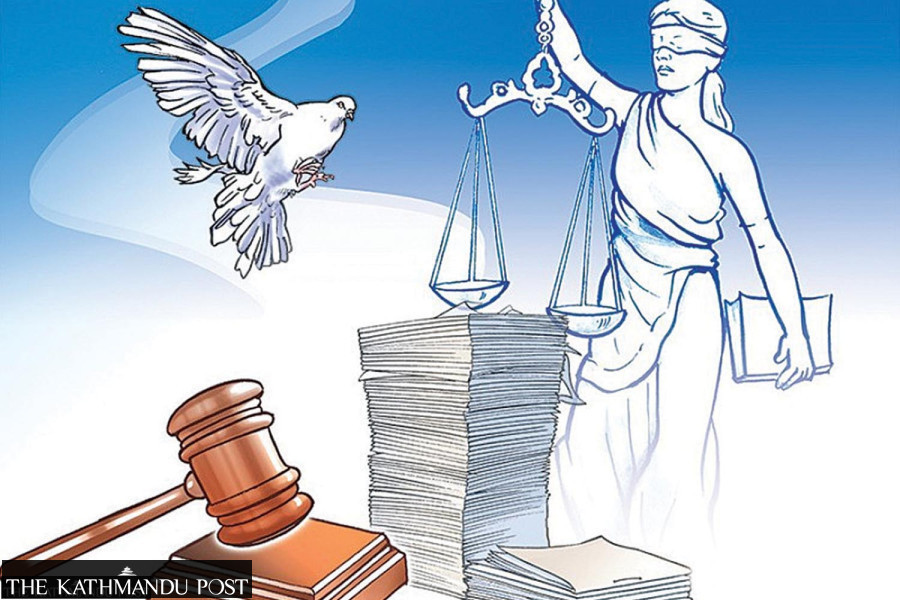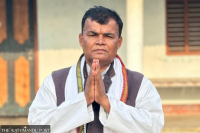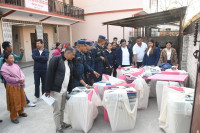National
Truth commission lacks tools to act amid rising war-era complaints
Four months on, new team is stuck as staffing and work regulations await approval.
Binod Ghimire
Despite receiving an encouraging number of new complaints from insurgency-era victims, the Truth and Reconciliation Commission still lacks the necessary legal and administrative instruments to expedite its work—nearly four months after the appointment of the new team.
The five-member team led by Mahesh Thapa was appointed on May 14, based on amendments to the Enforced Disappearances Enquiry, Truth and Reconciliation Commission Act made in August last year. The new team called applications from the victims, who could not file in the past for various reasons, with a three-month deadline. The victims, across the nation, lodged 15,191 new complaints, taking the total count to 78,909. It already had 63,718 cases pending.
However, a week short of four months after the new team took over, neither the regulations nor the organisation and management (O&M) survey have been approved. Also, the commission has yet to give final touches to its four-year strategy. The revised Act has given four years to the truth commission and the Commission of Investigation on Enforced Disappeared Persons to complete their work.
Speaking at an interaction in the Capital on Sunday, Thapa said the truth commission has already given its feedback on the regulations, which the Ministry of Law, Justice and Parliamentary Affairs is finalising. However, the regulations have yet to be discussed with conflict victims, the key stakeholders in the transitional justice process.
Even as commission officials claim they will mobilise the teams for truth-seeking after the Dashain festival (mid-October), the government has yet to approve the O&M survey, which determines how many staff members are necessary under which category.
“We have already forwarded the survey report for approval. The new staff will be appointed after its approval,” said Thapa, refraining from giving the exact number of staff they have proposed to the government. At present, the truth commission has 89 postings, but several of them remain vacant.
The commission is also yet to formalise its four-year strategy, demarcating which task will be accomplished when. “We believe the commission will accomplish its job before the completion of the four-year tenure,” Thapa claimed but he refused to give the breakdown of tasks and its timeframe.
During the interaction, the commission’s officials claimed that everyone who came to file the complaints were satisfied with the commission’s performance. However, not all victims who lodged the complaints recently agree. The National Association of Conflict Rape Victims, which facilitated in filing the most of 3,912 complaints related to conflict-era rape and sexual violence, said it filed the complaints with five different conditions.
Devi Khadka, coordinator of the nextwork of conflict-related sexual violence victims, said they had asked Thapa, the commission chair, to give assurances in writing that their concerns be addressed. However, he refused saying the commission would soon come up with plans to address their concerns. “We have yet to hear from the commission. We will wait for a few more days,” she told the Post.
The commission was formed despite reservations from a section of the victims and human rights activists. As many as 334 of them, on August 12, filed a writ petition at the Supreme Court alleging that the government’s latest selection process was marred by political power-sharing and the appointment of unqualified individuals. They have also demanded revocation of some provisions of the revised Act. The hearing is slated for Wednesday.
Asked what has the commission done to bring those dissatisfied on board, Thapa said, “We have also interacted with the dissident victims multiple times.” However, the victims, who are refusing to cooperate with the commission, say not a single meeting has been held.
Gopal Shah, chair of the Conflict Victims’ National Network, said he is yet to get calls from any office bearer. “I was called by an official some time after the new team was appointed. Since then I have not heard from the commission. There has not been a single meeting with the petitioners,” Shah told the Post.
First formed in 2015, the two commissions have already been constituted three times. Other than accepting complaints, they have not been able to make any progress in delivering justice to the thousands of insurgency victims.




 23.27°C Kathmandu
23.27°C Kathmandu















